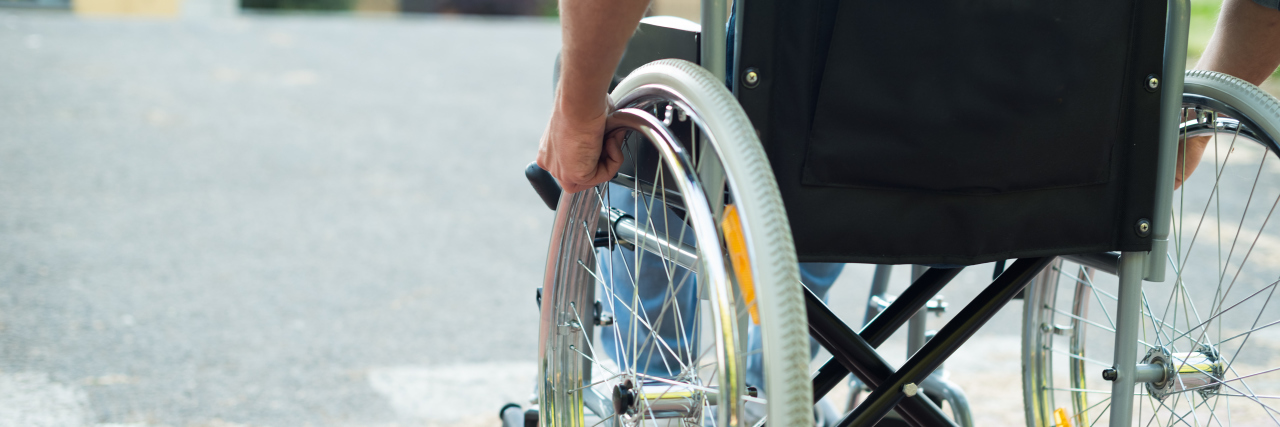The Wheelchair Bill of Rights I Wish Able-Bodied People Would Follow
Being a part-time wheelchair user is a jarring experience, for me at least, because you experience how the general public treats you walking vs. rolling. For example, I was rolling down the street yesterday and trying to go as fast as I can in my manual wheelchair. My leg was super sore that day but I still really wanted to exercise so I choose to “take a jog” and go down the street. As I rolled, a person gave a congratulatory honk. While it was encouraging, it was also kind of annoying to be congratulated for doing something no one would congratulate an able-bodied person for doing.
- What is Fibromyalgia?
- What Are Common Fibromyalgia Symptoms?
My most annoying event was when I went to an art festival with a friend and their family. It was a generally frustrating day because there were a lot of obstacles and I had just learned how to lift my front casters off the ground. Throughout the festival, there were mats to cover the cables running the rides. In order for me to go over them, I had to lift my front casters onto them, so it took me few seconds, but I could do it by myself. However, people kept assuming they could “help” by simply pushing my chair harder. At one point I was trying to go over a bump and a random man tried to grab my wheelchair by the footrest in order to help me while someone, who I am still unsure of the identity of, tried to jam my wheelchair forward over the bump, almost knocking me out of my seat. He did this without permission and apparently without thought. I ended up just yelling “I can do this if everyone gives me space.” With a bit of effort, I went over the bump. Then a random woman clapped. It was humiliating and frustrating.
This event inspired me to write this post with the help of my Facebook group LGBTQ+ spoonies: a group for chronically ill and disabled queer people. If you’re LGBTQIA+ and disabled or chronically ill, feel free to join us.
This is a wheelchair bill of rights and rules I wish all able-bodied people would follow. I hope this can educate people a bit on how to act around people in wheelchairs.
1. Don’t push my wheelchair without permission, unless it’s an emergency. You wouldn’t pick up a grown man and carry him without asking him. If someone is in your way, you don’t touch them and reposition their body. If you randomly push me, that’s what you’re doing.
2. Don’t randomly stop pushing my wheelchair if you volunteered to push it. I will stop paying attention and run off into the road.
3. My wheelchair is not a toy. No, you can’t take a ride. No, you can’t try it out. No, you can’t use it ’cause you’re “sore.”
4. Don’t question why I need it. Some people need a wheelchair all the time but can walk. Some people only need their chair sometimes. Some people might need a chair one hour but not the next. It’s not your concern.
5. Please don’t clap or cheer me on just for moving. It’s weird. Also, don’t call me an inspiration for doing basic activities of daily living. It’s awkward.
6. Don’t lean on someone’s wheelchair or use it as a coat rack. I am not a shopping cart.
7. When I legitimately need help, it’s OK to help me. If I’m in danger of falling, you can grab me. If I start to roll off course and off the sidewalk, you can grab me. A lot of downtown areas are on hills and slants and it’s easy for new wheelchair users to get into peril. This is only time it’s acceptable to touch someone’s chair without asking.
8. This is not a race. If you are hanging out with me, walk at my pace.
9. I am not a piece of furniture. I am not taking up too much space! I just am human being that needs more space.
10. I am not too young to need a wheelchair. Disability happens at every age. Accept that.
11. Don’t baby talk me. The chair doesn’t equal intellectual disability. And people with intellectual disabilities should be spoken to respectfully also, not baby talked. Address someone by the age they look and only change your speech level if you see they don’t understand. Either way, don’t ever baby talk a stranger; it’s rude.
12. Don’t ask me how I became disabled. If you just meet someone with a tattoo that said “R.I.P. Mom,” you wouldn’t ask them how their mom died. It would be considered rude. Then why ask me why I am in a wheelchair? Why are you entitled to an intimate and complex piece of my life story when you don’t even know me? Not that there’s something inherently tragic about being in a wheelchair, but you don’t have the right to know why I am in one if you’ve just meet me. Just ask me how I am doing.
I hope this article helps able-bodied people better understand how to interact with people in wheelchairs. If you are a part-time or full-time wheelchair user, feel free to add your own tips below.
We want to hear your story. Become a Mighty contributor here.
Getty image by Minerva Studio.

